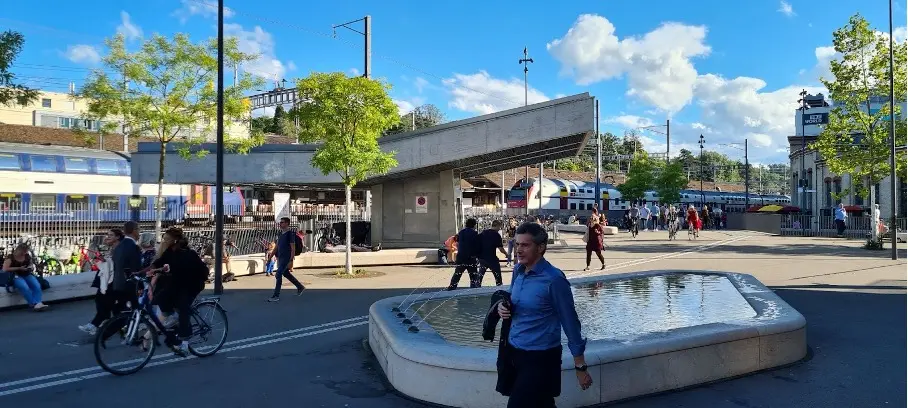City of Winterthur and ZHAW Datalab: From Data to Action
More than 100 representatives from the City of Winterthur and ZHAW attended the WinLab Brownbag Lunch to discuss the question: "How can we use data to shape the future of Winterthur?" After short presentations on open government data, data-driven mobility planning, and data-based decision-making, participants exchanged ideas at a topic-specific marketplace, laying the foundation for future projects.

"In Switzerland, over 12,000 datasets from 141 organizations and administrations are publicly available," said Uwe Thümmel to a full room at the Alte Kaserne Winterthur. He, along with Fabian Bardos, is the project leader for Data Analytics in the City Development Office of the City of Winterthur and explained the value of the Open Government Data (OGD) treasure trove. This data is intended to create added value for the population. The promotion and preparation of OGD and the development of data competencies are important aspects of their work.
In his keynote speech, Uwe Thümmel showed how the City of Winterthur uses OGD to promote efficiency, transparency, participation, innovation, and value creation. He wants to reach as many people as possible. In the latest project "Winterthur in Numbers," the city's data will be made accessible to everyone starting in February.
Data in Practice
The ZHAW Datalab was founded in 2013 as one of the first Data Science Labs in Europe. It brings together 12 institutes and centers from four departments that deal with Data Science. The members have a background in research and teaching and have built a network of data scientists with connections to industry partners. Thoralf Mildenberger is a lecturer in Computational Statistics and works at one of the founding members of the ZHAW Datalab, at the Institute for Data Analysis and Process Design of the ZHAW School of Engineering. In his presentation, he reported on successful projects from practice, such as a query tool for the Zurich rent survey, a statistical analysis of the workload of the social services of the City of Winterthur, a web-based interface for planning city bus routes in the Smart City program of the City of Winterthur, and a project for efficient monitoring of traffic light control.
Geo-Data: Digital Mobility
Josef Spillner is a lecturer in several study programs at ZHAW and works at the Institute for Computer Science, another founding member of the ZHAW Datalab. His research activities include distributed cyber-physical systems (cloud, big data, IoT/edge) and paradigms for applications in smart cities and regions. "People, animals, and vehicles are in motion and create movement models," said Spillner. These movements can be optimized using geoinformation, timetables, and weather forecasts. Based on studies conducted at the interface between the physical world and software logic, his input showed the state of the art and participation opportunities for the City of Winterthur.
Data as the Basis for Decisions
The final talk, "From Analysis to Interpretation: Business Intelligence and Sensemaking in City Administration", was held by Datalab Associate Lukas Augustin, a scientific employee at the Institute for Public Management (IVM) of the School of Management and Law. He showed why data alone is not enough to make good decisions and what roles data literacy and stories play. The presentations and the event provided a solid foundation for a theme-specific exchange between the City of Winterthur and ZHAW.
The event clearly demonstrated how public data can be used to create a concrete added value for the population and the city, and how the practice-oriented methods and applications of ZHAW can support this. The WinLab Brownbag Lunches take place every semester and aim to promote exchange and cooperation between the City of Winterthur and ZHAW.
Further information:
What is the ZHAW Datalab?
The Datalab was founded in 2013 as one of the first Data Science labs in Europe. It currently comprises 12 institutes and centers from 4 different departments (School of Engineering, Life Sciences and Facility Management, School of Management and Law and Applied Linguistics). The members have a background in research and teaching, established a network of data scientists and have connections to partners from industry.
The research agenda covers areas such as database and big data technology, data mining, statistics and predictive modelling, machine learning, privacy, security and ethics and much more.
Datalab - The ZHAW Data Science Laboratory